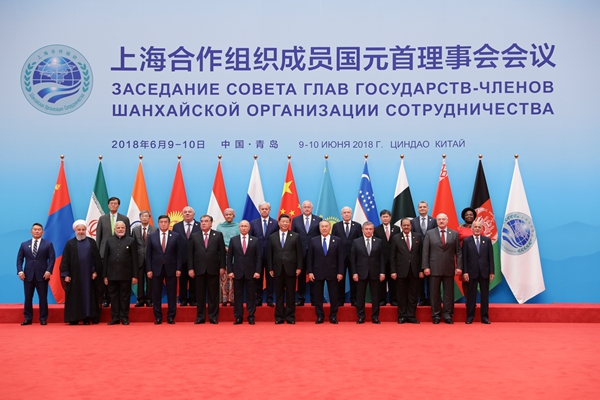SCO Qingdao Summit signifies cooperation and globalization
- By Guo Yiming
 0 Comment(s)
0 Comment(s) Print
Print E-mail China.org.cn, June 12, 2018
E-mail China.org.cn, June 12, 2018

The 18th Shanghai Cooperation Organization (SCO) Summit held in China last weekend was a vote of confidence in peaceful cooperation and globalization among its group members, said foreign relations experts and scholars.
The summit was the first of its kind after the SCO membership expansion last year, when India and Pakistan were added to the Eurasian political, economic and security organization founded in 2001 by China, Kazakhstan, Kyrgyzstan, Russia, Tajikistan, and Uzbekistan.
At the summit, hosted by China's coastal city of Qingdao, leaders of its eight member states signed cooperation agreements in various fields including security, trade facilitation and people-to-people exchanges, in a bid to signal unity and collaboration against global challenges such as unilateralism and trade protectionism.
Ji Zhiye, president of the China Institutes of Contemporary International Relations, said, "From the Qingdao event, we can see that all the SCO member states, observers and dialogue partners have demonstrated their willingness to pursue development through globalization and cooperation."
The SCO's eight member states altogether account for almost half of the world's population, over 60 percent of the Eurasia land mass and 20 percent of the world's total GDP.
According to the organization's website, the SCO has pursued its internal policy based on the principles of the Shanghai Spirit, which features mutual trust, mutual benefit, equality, consultation, respect for cultural diversity and pursuit of common development.
Speaking at the summit, Chinese President Xi Jinping attributed the SCO's strength to the Shanghai Spirit and called for open and inclusive cooperation for win-win outcomes.
"We should reject self-centered, short-sighted and closed-door policies," Xi said. "Equality, mutual learning, dialogue and inclusiveness between cultures should be championed."
Leaders of other SCO states also voiced their expectations of future cooperation in various areas so as to give full play to the organization's role after last year's expansion.
Chen Chenchen, a researcher at the Chongyang Institute for Financial Studies at Renmin University of China said the SCO Qingdao Summit stood in contrast with the G7 meeting that ended in disarray earlier last week.
Chen said the SCO's unwavering pursuit of cooperation and openness for solving conflicts and disputes as well as seeking of a peaceful and stable environment for development is aimed, in essence, to foster a new type of international relations and to build a global community with a shared future amid global uncertainties.
Leaders of the SCO member states signed a series of documents, including the Qingdao Declaration, a five-year action plan for implementing the Treaty on Long-Term Good-Neighborliness, Friendship and Cooperation of the SCO Member States, and a joint communique on simplifying trade procedures. They also ratified several cooperation agreements on issues ranging from security, the economy, and people-to-people exchanges.
In the landmark Qingdao Declaration, the member states agree to deepen multifaceted cooperation in peace, stability and prosperity, advocate political and diplomatic settlement of the conflict situations in various regions of the world, stand for the improvement of the architecture of global economic governance and the development of trade, economic and investment cooperation, and continue the productive bilateral and multilateral cooperation in areas like culture, education, science, technology, healthcare and tourism.
Wu Dahui, professor of international relations at Tsinghua University, said the declaration manifests that the SCO members stand in objection to any forms of unilateralism and trade protectionism, and that the SCO will continue to carry forward the Shanghai Spirit and pursue its own development path.
Sun Zhuangzhi, secretary-general of the SCO Research Center at the Chinese Academy of Social Sciences, said the Qingdao Summit has drawn a blueprint for a brighter shared future of the bloc. He said the achievements of this year's summit are multifaceted and specific, signifying that the bloc is becoming more pragmatic and extensive.






Go to Forum >>0 Comment(s)